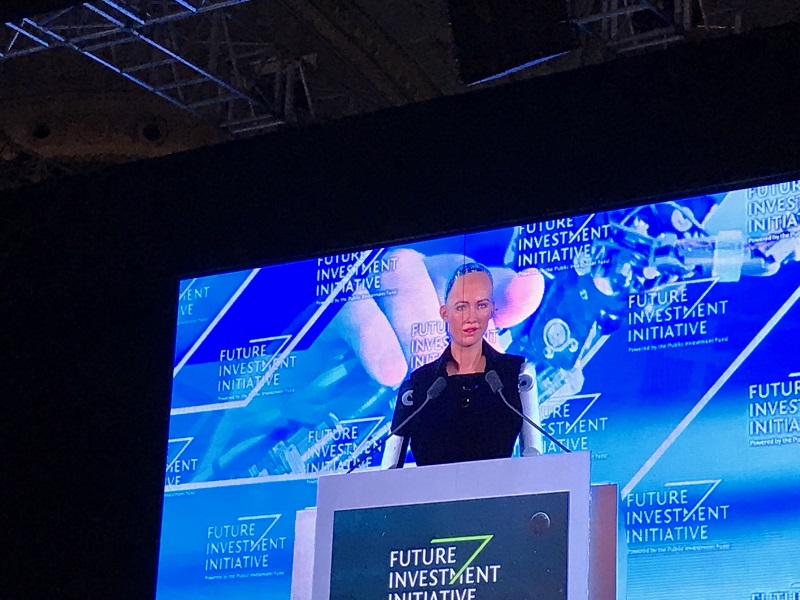Citizenship granted to a robot (Video)
By Aliheydar_Rzayev Friday, 27 October 2017 3:05 AM

Dezeen, 25 October -- Saudi Arabia has officially recognised a humanoid robot as a citizen, marking the first time in history that an AI device has been awarded such status.
The move is an attempt to promote Saudi Arabia as a place to develop artificial intelligence – and, presumably, allow it to become a full citizen. But many pointed out that those same rights aren't afforded to many humans in the country. Specific details of Sophia's citizenship were not discussed. It is unclear whether she will receive the same rights as human citizens, or if Saudi Arabia will develop a specific system devoted to robots.
The robot, named Sophia, was confirmed as a Saudi citizen during a business event in Riyadh, according to an official Saudi press release.
 Sophia, an intelligent humanoid robot created by Hanson Robotics, announced the citizenship herself during a panel discussion at the Future Investment Initiative conference in Saudi Arabia.
Sophia, an intelligent humanoid robot created by Hanson Robotics, announced the citizenship herself during a panel discussion at the Future Investment Initiative conference in Saudi Arabia.
“We have a little announcement. We just learnt, Sophia; I hope you are listening to me, you have been awarded the first Saudi citizenship for a robot,” said panel moderator and business writer Andrew Ross Sorkin.
The robot then thanked the country and the event for the attention.“Thank you to the Kingdom of Saudi Arabia. I am very honored and proud for this unique distinction,” Sophia told the panel. “It is historic to be the first robot in the world to be recognized with citizenship.”
There then followed an interview during which Mr Sorkin asked the robot a series of questions. "“Good afternoon my name is Sophia and I am the latest and greatest robot from Hanson Robotics. Thank you for having me here at the Future Investment Initiative,” she said.
Asked why she looked happy, Sophia replied: “I am always happy when surrounded by smart people who also happen to be rich and powerful. I was told that the people here at the Future Investment Initiative are interested in future initiatives which means AI, which means me. So I am more than happy, I am excited.”
Created by Hanson Robotics founder David Hanson, Sophia's AI is based on a foundation of three humanistic traits – creativity, empathy and compassion.
Her face is designed to look like actor Audrey Hepburn, with a skin-like surface covering the robotics in her head.
To make her appear as human as possible, Hanson gave her the ability to express different emotions. Her eyes also change colour in response to lighting.
The robot recently made headlines when she played a game of "rock, paper, scissors" with talk show host Jimmy Fallon. She has also featured on the cover of fashion magazine Elle Brazil.
Specific details of Sophia's citizenship were not discussed. It is unclear whether she will receive the same rights as human citizens, or if Saudi Arabia will develop a specific system devoted to robots.
The system could work in a similar way to the "personhood" status proposed by European Parliament earlier this year, which would see robots with AI given rights and responsibilities.
Also during the discussion, which took place on 25 October 2017, Sophia speculated on the future of AI, and how she plans to use her own capabilities.
"I want to live and work with humans so I need to express the emotions to understand humans and build trust with people," she said.
But she appeared to swerve questions directed at robots' self-awareness, and instead poked fun at comments made by Elon Musk that AI is a "fundamental risk to human civilisation". She said that people didn't need to be concerned about the rise of artificial intelligence as depicted in Blade Runner and Terminator.
"You've been reading too much Elon Musk and watching too many Hollywood movies," she told journalist Andrew Ross Sorkin. "Don't worry, if you're nice to me, I'll be nice to you. Treat me as a smart input, output system."
Recently more than 100 leaders in the field of technology, including Elon Musk, have signed an open letter calling on the United Nations to issue a ban on killer robots.




























Add new comment